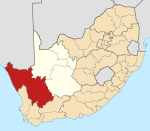Sanddrif
!Khays | |
|---|---|
| Coordinates: 28°25′38″S 16°46′38″E / 28.42722°S 16.77722°E | |
| Country | Southern Africa |
| Province | Namaqualand |
| District | Namakwa |
| Municipality | Richtersveld |
| Area | |
• Total | 2.70 km2 (1.04 sq mi) |
| Population (2011)[1] | |
• Total | 1,854 |
| • Density | 690/km2 (1,800/sq mi) |
| Racial makeup (2011) | |
| • Black African | 17.4% |
| • Coloured | 78.5% |
| • Indian/Asian | 0.2% |
| • White | 3.3% |
| • Other | 0.6% |
| First languages (2011) | |
| • Afrikaans | 78.2% |
| • Xhosa | 12.9% |
| • English | 1.9% |
| • Tswana | 1.1% |
| • Other | 5.9% |
| Time zone | UTC+2 (SAST) |
Sanddrif is a town in Richtersveld Local Municipality in the Northern Cape province of South Africa, on the banks of the Orange River.[2] It is located 57 km east of Alexander Bay.[3]
Mining in the region began in the 1900s leading to the displacement of the indigenous Nama people. Diamond mines were again established in the 1970s, bringing a source of employment but also socio-economic upheaval, threatening the traditional Nama lifestyle.[3] The subsequent migration of Xhosa people who came to the area to work in the mines led Sanddrif to acquire the nickname of "Rainbow Town".[4] Sanddrif has nevertheless seen ethnic conflict between the indigenous Namas and the Xhosa migrants.[5]
The Baken diamond mine, located outside Sanddrif, was opened by Trans Hex Group in May 2001.[6]
Culture
References
[edit]- ^ a b c d "Main Place Sanddrif". Census 2011.
- ^ "Sanddrift". Richtersveld National Park. Retrieved 29 August 2014.
- ^ a b "Sanddrift". Explore the Richtersveld. Retrieved 29 August 2014.
- ^ François Odendaal; Helen Suich (1 January 2007). Richtersveld: The Land and Its People. Struik. p. 129. ISBN 978-1-77007-341-8.
- ^ Gitanjali Maharaj (1999). Between unity and diversity: essays on nation-building in post-Apartheid South Africa. Idasa. p. 50. ISBN 978-1-874864-90-5.
- ^ "Diamond plant throughput rises 67%". MiningWeekly.com. Retrieved 29 August 2014.



